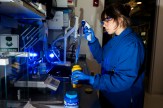This Northeastern sophomore is the youngest Electoral College member from Massachusetts
If Kamala Harris wins Massachusetts on Tuesday as expected, 19-year-old Kaveesh Pathak will serve as one of the state’s 11 Democratic electors.

When the U.S. presidential election ballots are counted on Tuesday, Kamala Harris is expected to win the state of Massachusetts. If that happens then Dec. 17 is shaping up to be a big day for Northeastern University sophomore Kaveesh Pathak.
On that day Pathak will be called to the Statehouse in Boston, where he and 10 other Massachusetts Democratic Party electors will confer the state’s 11 Electoral College votes to Harris.
Pathak, 19, is the youngest of the state’s 11 electors.
“It’s really a ceremonial position, but it’s a huge honor,” Pathak says. “After you serve as an electoral college member, your title becomes ‘The Honorable.’
“So my title will formally be ‘The Honorable Kaveesh Pathak,’” he says. “I feel older than I am because of that.”
Pathak earned his place as the result of an election within the Democratic State Committee, the board of the Massachusetts Democratic Party, in August. Competing against 50 older candidates, he recognized his underdog status.
“You realize people who run for this have usually been on the Democratic State Committee for, like, 20 years,” says Pathak, who is studying business administration and political science. “The candidates included former state reps, current and former governor counselors and even two former party treasurers.”
Pathak crafted his brief presentation around his political background, his future aspirations and the importance of Harris’s candidacy to his community.
Featured Posts
Pathak interned for the successful 2020 reelection campaign of Sen. Ed Markey, a Massachusetts Democrat. He also is the former Massachusetts field director for March for Our Lives, the nation’s largest youth led gun violence prevention organization. In 2021-22 he served as a communications assistant for the campaign of lieutenant governor candidate Tami Gouveia.
Last summer he served a Joe Moakley internship with the Massachusetts Democratic Party and was elected to the Democratic State Committee.
His political activism began in seventh grade in historic Lexington, Massachusetts, where he led a middle school walkout in response to the 2018 shooting at Marjory Stoneman Douglas High School in Parkland, Florida, that claimed 17 lives.
“I think a lot of kids our age will point to Parkland and what happened there,” says Pathak, who was appalled and angered by the ensuing political indifference that was expressed by elected leaders. “And then with climate [change], there’s all this science but [politicians respond by saying], ‘We’re just going to deny it. We’re not going to pretend it’s even happening.’
“This is my future on the line. There are parts of my life that will change tremendously because of this — and that’s why I want to get involved.”
Despite multiple efforts, Pathak had been unable to contact every member of the state party. He knew he would have to win support with an energetic and enthusiastic 30-second presentation.
“I thought, OK, what do people want to hear and what can I do to get them to vote for me?” says Pathak, whose parents are immigrants. “Well, there’s not many Indian-Americans in politics, especially in Massachusetts. I think I’m one of the few in the state committee. There’s not a lot of us.
“Kamala Harris would be the first Black woman and the first Indian-American to be president. So I wanted to emphasize that this is a really important election for my community.”
Pathak also quickly referred to his political experiences.
“I’ve been hustling for four or five years and I’m ready,” Pathak says. “I’m ready to take the step.”
His efforts were rewarded about 90 minutes later when the results were posted on a spreadsheet.
“I had a decent amount of votes,” Pathak says. “I was like, ‘Holy crap, I won, I did it.’”
Pathak, who is currently focused on pursuing a business career, does not envision running for public office. But the opportunity of serving as an elector energy has affirmed and fed his desire to be politically engaged.
“There’s so many ways to make an impact,” he says. “I want to learn and build my skills so I can eventually be a leader within the party in the future and that is something I’m really focused on. This is a great opportunity and I’m really happy because it’s moved my name up the radar a bit with my colleagues on the state committee. I would love to work my way up to potentially being in a leadership position within the State Committee or even becoming a member of the Democratic National Committee.”
But there are more pressing issues in the meantime. The outcome of the presidential race is one. His role as an elector in December is another.
“What’s going to happen, to my knowledge, is that we’ll go on the floor of the Statehouse,” Pathak says. “We’ll have an oath and then we’ll each cast a vote for Vice President Harris — or, hopefully, President-Elect Harris, which would be an incredible honor.”











